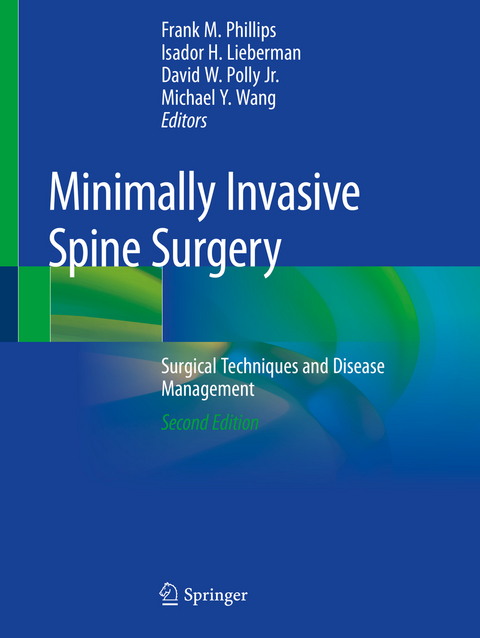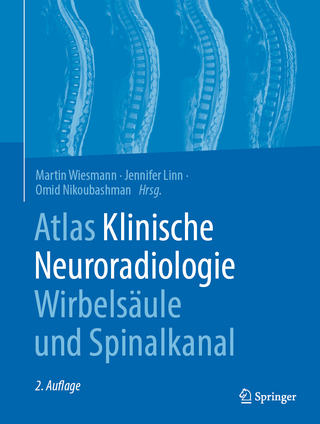
Minimally Invasive Spine Surgery
Springer International Publishing (Verlag)
978-3-030-19009-5 (ISBN)
The use of minimally invasive spine surgery (MISS) has grown rapidly over the last decade and remains the fastest growing area in spine surgery. Now in a revised and expanded second edition including 19 new chapters, this comprehensive textbook provides an updated presentation of the field of MISS, highlighting surgical techniques and clinical outcomes as well as providing a unique focus on how these techniques are applied for specific spinal conditions.
Minimally Invasive Spine Surgery, Second Edition includes detailed discussions of enabling technologies, surgical techniques, approaches to specific diseases and conditions, a new section on out-patient/ambulatory spine surgery, and strategies to manage the unique risks and complications associated with MISS. Each chapter, whether revised or new, is formatted in a consistent manner, including bulleted key learning points as well as review questions, pearls and pitfalls, and generous illustrations and intra-operative photographs.
Written and edited by thought leaders in the field, this user-friendly textbook will be an essential resource for orthopedic and neurosurgery trainees, as well as a valuable reference and review for spine surgeons and health care professionals who treat the spine.
lt;p>Frank M. Phillips, MD
Professor and Director, Division of Spine Surgery
Section Head, Minimally Invasive Spine Surgery
Fellowship Co-Director, Spine Surgery
Rush University Medical Center
Chicago IL, USA
Isador H. Lieberman, MD, MBA, FRCSC
Medical Director
Texas Back Institute
Texas Health Presbyterian Hospital Plano, Scoliosis and Spine Tumor Center
Plano, TX, United States
David W. Polly, Jr., MD
James W. Ogilvie Professor and Chief of Spine Surgery
Catherine Mills Davis endowed chair
Department of Orthopedic Surgery
Professor (W)
Department of Neurosurgery
University of Minnesota
Minneapolis, MN, USA
Michael Y. Wang, MD, FACS
Professor, Spine Director, & Chief of Neurosurgery at UMH
Departments of Neurological Surgery & Rehab Medicine
The Miller School of Medicine at the University of Miami
Miami, FL, United States
History and Evolution of Minimally Invasive Spine Surgery.- Philosophy and Biology of Minimally Invasive Spine Surgery.- Economics of Minimally Invasive Spine Surgery .- Learning Curve for Minimally Invasive Spine Surgery.- The Role of MIS Spine Surgery in Global Health: A Development Critique.- Microscopes and Endoscopes.- Intraoperative Neurophysiology Monitoring.- Image Guidance in Minimally Invasive Spine Surgery .- Robotic-Assisted Spine Surgery.- Fusion Biologics and Adjuvants in Minimally Invasive Spine Surgery.- Use of Stem Cells in Spinal Treatments.- Lasers .- Radiation Exposure and Avoidance in Minimally Invasive Spine Surgery.- Posterior Cervical Decompression.- Thoracic Decompression.- Lumbar Decompression Using a Tubular Retractor System.- Endoscopic Decompression.- Interspinous and Interlaminar Devices for Decompression.- Minimally Invasive Posterior Cervical Fixation.- Percutaneous Pedicle Screws.- Minimally Invasive Facet Screw Fixation.- Minimally Invasive Transforaminal Lumbar Interbody Fusion.- Minimally Invasive Midline Pars-Cortical Screw Techniques.- Minimally Invasive Spinous Process Fixation and Fusion.- Mini-Open Anterior Lumbar Interbody Fusion.- Minimally Disruptive Lateral Transpsoas Approach for Thoracolumbar Anterior Interbody Fusion.- Anterior Column Reconstruction for Sagittal Plane Deformity Correction.- Thoracoscopic Fusion.- Pre-Psoas Approaches for Thoracolumbar Interbody Fusion.- Endoscopic Spinal Fusion.- Navigated Spinal Fusion.- Cervical Herniated Nucleus Pulposus and Stenosis.- Thoracic Herniated Nucleus Pulposus.- Lumbar Herniated Nucleus Pulposus.- Lumbar Spinal Stenosis.- Lumbar Spondylolisthesis.- Adolescent Scoliosis.- Adult Scoliosis.- Anterior Column Realignment (ACR): Minimally Invasive Surgery for the Treatment of Adult Sagittal Plane Deformity.- Thoracolumbar Spine Trauma.- Minimally Invasive Surgery for Spinal Tumors.- Pathologic Fractures.- How and When to Incorporate Minimally Invasive Surgery for Treatment of Deformity: Decision-Making.- Sacroiliac Joint Dysfunction.- Minimally Invasive Spine Surgery in the Elderly.- Clinical and Economic Advantages of Out-Patient Spine Surgery.- Clinical Outcomes of Outpatient Spine Surgery.- Selection of Appropriate Patients for Outpatient Spine Surgery.- Analgesia and Anesthesia to Enable Out-Patient Spine Surgery.- Postoperative Care Following Outpatient Spine Surgery.- Choice of Minimally Invasive Approaches: A Review of Unique Risks and Complications.- Minimally Invasive Spine Surgery Complications with Implant Placement and Fixation.- Neural and Dural Injury in Minimally Invasive Surgery.- Pseudarthrosis.
| Erscheinungsdatum | 28.01.2021 |
|---|---|
| Zusatzinfo | XVIII, 702 p. 352 illus., 243 illus. in color. |
| Verlagsort | Cham |
| Sprache | englisch |
| Maße | 210 x 279 mm |
| Gewicht | 1936 g |
| Themenwelt | Medizinische Fachgebiete ► Chirurgie ► Neurochirurgie |
| Medizinische Fachgebiete ► Chirurgie ► Unfallchirurgie / Orthopädie | |
| Schlagworte | Endoscopic decompression • Fusion biologics and adjuvants • Interspinous fusion • Intraoperative neurophysiology monitoring • Lumbar spinal stenosis • Minimally invasive facet screws • Minimally invasive spine surgery (MISS) • Posterior decompression • Pre-psoas approach • Pseudarthrosis • Robot-assisted spine surgery • Sacro-iliac joint fusion • Scoliosis • spinal deformity • spinal fusion • Spinal trauma • Spinal tumor • Spondylolisthesis • Thoracoscopic fusion |
| ISBN-10 | 3-030-19009-9 / 3030190099 |
| ISBN-13 | 978-3-030-19009-5 / 9783030190095 |
| Zustand | Neuware |
| Informationen gemäß Produktsicherheitsverordnung (GPSR) | |
| Haben Sie eine Frage zum Produkt? |
aus dem Bereich


